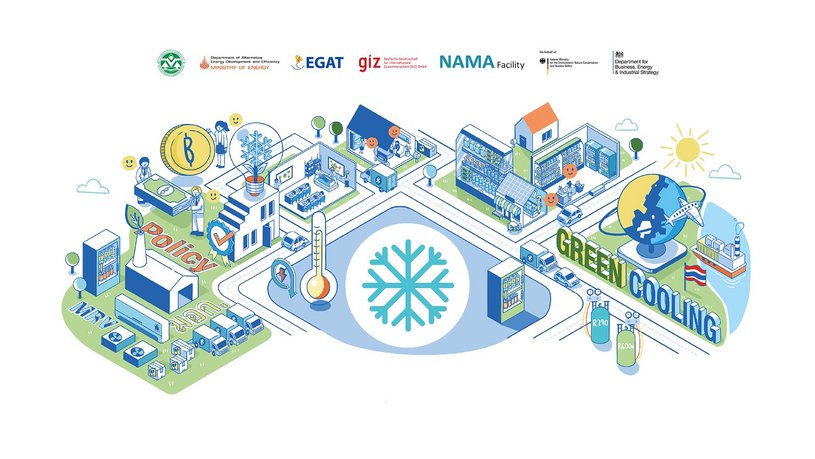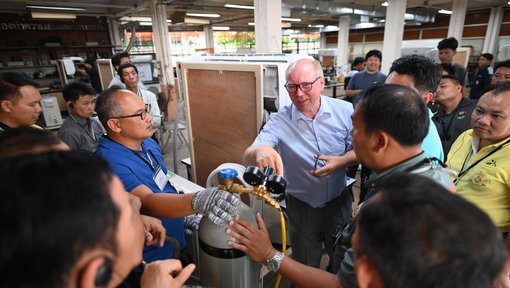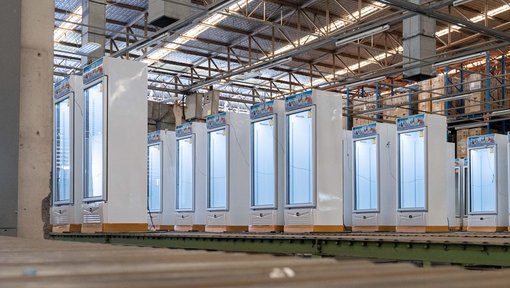It defined safety standards, established an MRV system, facilitated technology transfer, and set up financial incentive schemes – the list of achievements of the RAC NAMA project is long. An assessment.
Dr. Philipp Pischke is the RAC NAMA Director in Thailand. Today, he and his team look back on five successful years. From 2016 to 2021, RAC NAMA has successfully supported Thailand in its energy saving efforts and helped it achieve its climate change targets. How? Primarily through the introduction of climate-friendly and energy-efficient cooling technologies. This is sometimes easier said than done. To Dr. Pischke, it was clear from the very beginning that the project would require a coherent approach and concerted efforts. “Our project targeted our intervention through policy, technical and financial considerations, with respect to both the demand and supply sides and hence a continuous cooperation with the RAC industry and its end-users,” he says.
Block 1
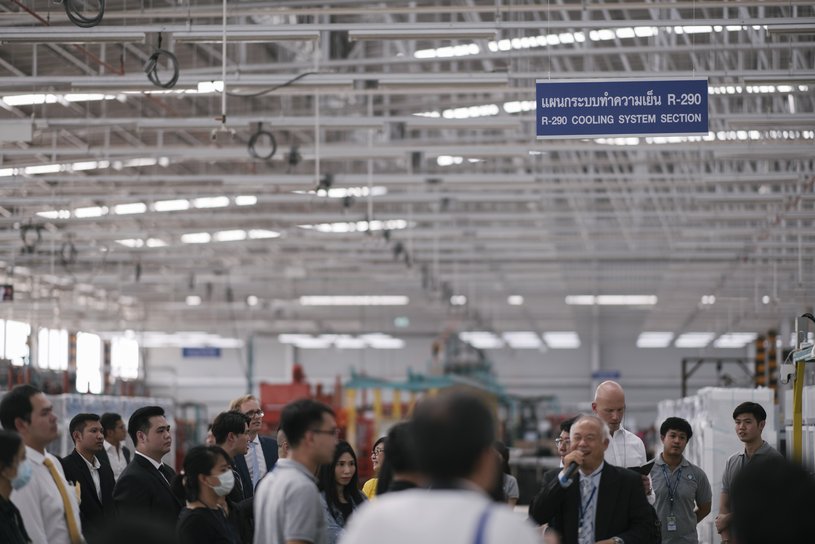
The achievements, he goes on, are numerous: “We have supported responsible ministries and agencies to define safety standards and relevant regulations in line with international best practices, demonstrated best practices of energy performance standards, labels and other incentive schemes, established a Monitoring, Reporting and Verification system (MRV) for the RAC sector to serve the country’s reporting obligations to the UNFCCC, assisted in technology transfer and adoption to local producers, and increased the demand for Green Cooling products by setting up financial incentive schemes which increase the attractiveness for consumers in Thailand.”
Grid Achievements
1
10 domestic producers have been assisted in moving towards the production of more modern and energy-efficient cooling equipment.
2
More than 150,000 Green Cooling units have been produced for the domestic and export markets, contributing to 350,000t CO2eq of GHG mitigation.
3
In the commercial refrigeration sector, it is projected that the cooling units will attain 90% of the domestic market reach in the next 3 years.
1
10 domestic producers have been assisted in moving towards the production of more modern and energy-efficient cooling equipment.
2
More than 150,000 Green Cooling units have been produced for the domestic and export markets, contributing to 350,000t CO2eq of GHG mitigation.
3
In the commercial refrigeration sector, it is projected that the cooling units will attain 90% of the domestic market reach in the next 3 years.
Block 2
On top of that, RAC NAMA has built the necessary training infrastructure for service technicians by organising “train the trainers” courses for 222 head technicians and chief trainers from the Office of the Vocational Education Commission (OVEC), the Department of Skill Development (DSD) and partner producers. They are expected to pass on the knowledge to their peers and establish eight training centres nationwide. To prepare the service sector for the changing requirements and safety standards related to natural refrigerant technology, RAC NAMA has upgraded testing facilities to meet increasing demand for the product testing. It has also modernised policy frameworks, coordinated support, developed the expertise and resources of private and public institutions, and leveraged private and public financing to bridge prevailing investment gaps.
Block 3
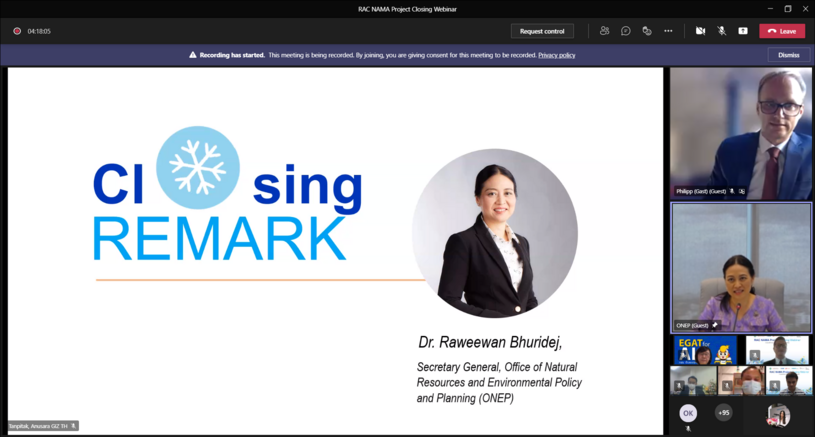
Success stories from the implementation of RAC NAMA were summarised and disseminated at a closing webinar, along with a presentation on future strategies. Participants included representatives from the Office of Natural Resources and Environmental Policy and Planning (ONEP), the Department of Alternative Energy Development and Efficiency (DEDE), the Electricity Generating Authority of Thailand (EGAT), the Department of Industrial Works (DIW), DSD, OVEC, the Electrical and Electronics Institute, King Mongkut’s University of Technology North Bangkok (KMUTNB), the Federation of Thai Industries (FTI), the Thai Industrial Standards Institute (TISI), and Thailand International Cooperation Agency (TICA).
Info
In cooperation with ONEP, DEDE, EGAT and GIZ, RAC NAMA facilitates a shift away from the production and use of fluorinated refrigerants due to their high GWP. Alternatives exist: natural refrigerants could support Thailand on its way to becoming a low-carbon society. Green Cooling technologies come with zero ODP and very low GWP.
Block 4
Dr. Raweewan Bhuridej, Secretary-General at ONEP, was eager to highlight the oft-neglected role of the RAC sector in producing GHG emissions: “Nowadays, the use of RAC technologies accounts for approximately 50% of the electricity consumed in Thailand, with the RAC sector being one of the largest greenhouse gas emitters.” Dr. Bhuridej argued that RAC NAMA was crucial in developing more ambitious NDCs: “Improving technology is an important factor in reducing global warming and helping Thailand to achieve the goal of reducing greenhouse gas emissions according to the NDCs. By seeking to introduce climate-friendly and energy-efficient cooling technologies while promoting new business opportunities, R&D, and knowledge transfer, the RAC NAMA project is the country’s most significant climate action in the cooling sector and has greatly contributed to our NDC effort.”
Somjai Bunnag, Director of the Project Environment Division at EGAT, was particularly satisfied with her organisation’s efforts in pushing the private sector towards broader acceptance of natural refrigerants: “In December 2017, EGAT assumed responsibility for managing the RAC NAMA Fund, with a total budget of EUR 8.3 million (approximately THB 300 million), on behalf of the Thai Government. A number of financial instruments have been defined for the whole demand and supply chain, as well as the service sector to incentivise producers in the switch to natural refrigerant products, boost consumers’ demand for these new products and improve the skills of technicians and the capacities of testing institutes to serve the growing demand over the long term.”
Gallery
Thanks 1
The strong cooperation between the partners made RAC NAMA a success. “All of the positive results from the implementation, especially a growing alliance for Green Cooling technologies in Thailand, require a lot of convincing and many joint efforts, and I would like to extend my thanks to all the partners that have made Green Cooling happen,” announced Dr. Pischke.
Quote
"I look forward to further conserving our climate and environment together."
Thanks 2
Dr. Bhuridej too expressed her thanks to “the NAMA Facility, through the German and British Governments, for financing the RAC NAMA project, transferring know-how and fostering international cooperation.” What’s next? Dr. Bhuridej exclaimed she would “look forward to further conserving our climate and environment together.”
Somjai Bunnag was equally buoyant: “EGAT is proud to have played a role in pioneering Thailand’s first climate finance project and initiating the sector-wide transition to green cooling technologies. Looking forward, EGAT will build upon these successes and utilise the experience and knowledge gained from the implementation of the RAC NAMA Fund to manage the new Cooling Innovation Fund (CIF), under the ownership of EGAT, to further promote sustainable innovation and market transformation to climate-friendly and energy efficient cooling technologies using natural refrigerants. With the funding of approximately THB 180 million, the CIF is expected to start in the fourth quarter of 2021. EGAT looks forward to continuing the good cooperation that we have with all agencies and to forming new partnerships.”
While the RAC NAMA project may have come to an end, the fight for a naturally cool future in Thailand will evidently continue.

